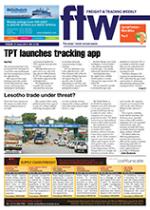Would banning trucks from
driving at night cut back on
the number of accidents, and
more importantly in the case of
accidents involving trucks, the
SA accident death rate?
Behind this question lies
the fact that, six months after
Kenya’s National Transport
and Safety Authority (NTSA)
banned night time driving for
public service vehicles (PSVs),
it claims to have recorded
a reduction of 50% in road
accidents.
A primary answer to the
original question would be:
Of course it would lead to
a considerable cut in truck
accidents.
But that would be due to the
fact that you would have taken
a huge number of trucks off the
road for the X hours a night
that you would have the ban.
That same argument arose
regarding the Kenyan exercise.
A transport consultant in
Kenya said: “When you
effectively reduce the operating
time for buses by half, it is only
logical that road accidents
involving buses will reduce by
half.
“The overall reduction in
road accidents – when you
include all non-PSV vehicles –
is about 20%.”
But such a ban would
certainly cut out the peak time
for driver fatigue, according
to Carl Webb, MD of Project
Logistics Management, and a
member of the Road Freight
Association (RFA) abnormal
transport committee. “The
UK’s Royal Society for the
Prevention of Accidents, in
its extensive study on driver
fatigue and road accidents,
found that sleep-related
accidents peaked in the early
hours of the morning, between
02:00 and 06:00,” he told
FTW. “They calculated that
drivers are 50 times more likely
to fall asleep at the wheel at
02:00 than at 10:00.”
So driver fatigue is an
important factor, he added.
And the other trucking
specialists FTW quizzed on the
issue also rejected the theory for
a number of reasons.
A main one of which, and
expressed by Gavin Kelly,
technical and operations
manager of the RFA, is: “It
would have a huge impact on
the logistical process in this
country because a huge amount
of freight moves at night,
especially on the country’s main
freight route, the N3 Gauteng-
Durban highway.”
Garth Bolton, joint CEO
of the major haulier, Cargo
Carriers, is equally anti-ban.
“I would certainly argue
against it,” he told FTW.
“Obviously, in a lot of
instances, operations are
double-shifted (one driver
for day and another for night
driving). That’s especially true
for perishable cargoes, where
there is urgent need to get them
to the markets on time, while
still fresh.”
Bolton also stressed a cost
factor.
“It would push up costs for
truckers, who would not be
getting full vehicle utilisation,”
he said. “And the consequence
of increasing the price of the
transportation of goods would
therefore push up prices in
general.”
He noted that it would also
probably hit the day-time
accident rate. “More trucks
then being on the road could
increase accidents during
the day, and cause even more
congestion.”
Barney Curtis, CEO of
the Federation of East and
Southern African Road
Transport Associations
(Fesarta), also suspects that
the whole story about the
Kenyan situation hasn’t been
told.
“I think that Kenya has been
pretty tough on enforcement
in recent years,” he told FTW.
“And that has as much to do
with the reduction in accidents
as the ban on night driving.”
INSERT & CAPTION
To meet SA’s
transport demands,
trucks need to drive
at night.
– Barney Curtis
CAPTION
Banning night driving for trucks is not feasible in South Africa.

